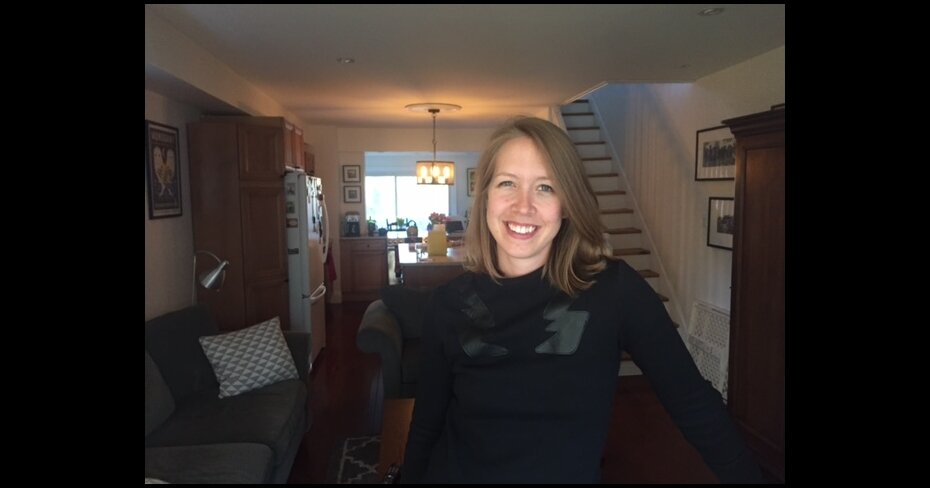The Modern House Hunt: Surviving bidding war fatigue in Toronto
By: Alexandra Bosanac on April 25, 2017
The Modern House Hunt is our five-part series chronicling the realities of buying a home in Canada today. From record prices to frenzied bidding wars, we take a look at stories from the housing trenches.
It’s the weekend and Sarah Boesveld is lounging in her bedroom, enjoying the sun’s rays, while her retriever curls up on the floor of her closet. Almost a year ago, she bought her home with her husband and she’s clearly enjoying the small pleasures that homeownership brings.
"It's been awesome seeing each season change,” she says. “We hadn't seen spring yet and now the buds are coming out in the trees in the front. There's something satisfying about seeing a year pass."
Boesveld bought her semi-detached house near Coxwell and Danforth in Toronto’s east end in May 2016. It has two bedrooms, one bathroom, and a balcony overlooking the ravine that runs behind her house. She and her husband, Pat Lynch, are eminently pleased with their investment — but it was a battle to get it. They were outbid on five different houses before they were finally successful. Bidding wars are now common in Toronto and housing prices have surged 30% from this time last year.
Even now, Boesveld feels like “pure luck” had a lot to do with it.
Luck, with a side of persistence, perhaps: Boesveld’s story is a case study on how to win a bidding war in Toronto without selling your soul.
Shady dealings
Since both work in journalism, Boesveld, a senior writer at Chatelaine, and Lynch, a freelance editor, were well aware of the craziness of the Toronto housing market. They knew they weren’t going to be able to buy a place in the neighbourhood where they rented the first floor and basement of a house in Toronto’s picturesque Riverdale neighbourhood — especially not in their price range of $500-600,000.
They knew they would have to moderate their expectations, but even with that knowledge, they weren't prepared for some of the tactics other buyers pulled to win the favour of sellers.
They weren't prepared for some of the tactics other buyers pulled to win the favour of sellers
For instance, their realtor showed them a spacious semi-detached house in Little India, a neighbourhood in Toronto’s east end. Along with one other buyer, Boesveld and her husband put in a preemptive offer. The couple offered slightly more than the asking price and moved up the closing date.
“We thought for sure we were going to get the house,” says Boesveld.
What they didn’t realize was that the other buyer was using her father as her real estate agent. “Her dad waived the commission fee,” says Boesveld, meaning they were able to add that 20% to their bid. “We didn’t have that advantage.”
A bungalow in East York that caught their eye went $100,000 over the asking price. Boesveld and Lynch later learned that the seller set a low asking price to stoke a bidding war. “They lowballed how much they were expecting because they know people are going to bid,” says Boesveld.
What they didn’t realize was that the other buyer was using her father as her real estate agent
Another case involved a bungalow in Mimico, in the opposite end of the city. “It was right by the lake, had a parking space — things that are hard to find in Toronto,” says Boesveld. Again, they offered above the asking price but still didn't get it. “We were using our RRSP as a first time homebuyer… but it took too many weeks to close because the of the RRSP.”
The sellers were the children of the original owner, who was elderly and was no longer living in the house. They had stripped the house, taking everything, “even the doorknobs,” Boesveld recalls, and wanted a shorter closing date.
“Those were two cases where we were offering the most money but there was some other kink, some other thing that says, ‘that’s not going to be your house.’ We really had to hang on to our patience and persistence,” she says.
Numerous studies suggest the shortage of housing stock in the city is caused by people staying put, shutting out first time buyers. “It felt like all the sellers had either died or were in a nursing home, or their family was not sticking around in Toronto,” says Boesveld. There were times when she felt like giving up and looking outside the city. “It was really hard. I was ready to give up before Pat was and luckily he was determined.”
The winning bid

At this point, Boesveld was getting frazzled. She was out of town to visiting her family for a much needed break when her husband called her: he had found a house in their preferred neighbourhood and had a good feeling about it. “I was like what? Whatever, there’s no way. But he was right.”
The seller was taking offers on a Monday night, as were a couple of other houses in the area. “They probably thought they were being clever, trying to improve the chances of having a lot of people bidding.” But if that was their strategy, it backfired. “Only two other people put in offers and we put in our best offer… and we did overbid on the asking price.” Boesveld thinks it’s likely that the other buyers had not been in the market as long and didn't put in their best offer.
“Basically, we had luck that there were other offers [that weren’t as good as ours]. Persistence and luck that it eventually came our way.”
Lessons learned
With Toronto housing prices showing little sign of abating any time soon — even with newly introduced measures designed to cool the market, it’s still early to gauge what effect they’ll have — some are questioning the wisdom of jumping into the market over waiting it out.
Ultimately, says Boesveld, you have to do what’s right for you.
"We had a lot of discussions. We had been married for a couple years and we want a family...We had to go with our own feeling on it,” she says. “We feel it was a smart business decision and you have to live your life and make decisions for your family, so we just kinda went for it.”
Boesveld does say that the fierceness of the market can make it easy to lose perspective. For about two months, most of Boesveld’s free time revolved around researching listings and going to open houses. Sheer exhaustion can often take a toll on buyers and cause them to make emotionally-driven decisions. "There was a lot of trying to talk each other down, dreaming too much of a certain thing.”
For about two months, most of Boesveld’s free time revolved around researching listings and going to open houses
Boesveld and Lynch kept themselves grounded by continually reminding each other of their primary goal: to find a house that wouldn’t overextend them financially.
“We had to look at how much money we would make and then only offer what we could manage,” says Boesveld.
“We ended up with the house we fell in love with. We thought we were in love a few times, as you do,” she says. It isn’t turn key but “we didn't want a pristine home. We wanted to improve on it ourselves… There's a satisfaction to it. You feel settled. This is ours.”
Correction: This blog post originally stated that Sarah Boesveld and her husband lost six bidding wars before they purchased their house. It has been updated to reflect that they lost five bidding wars.
432e.jpg)
b188.jpg)
